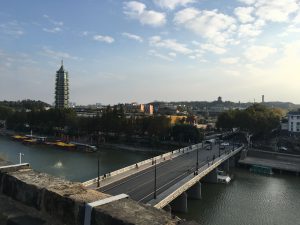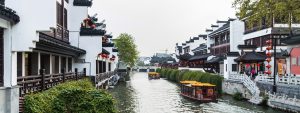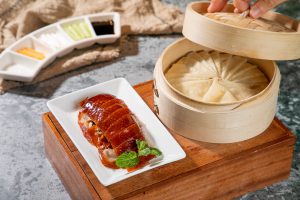Nanjing, a vibrant and peaceful city, is located in China’s affluent Yangtze River Delta region. Walking through the streets, you immediately feel the convenience and prosperity of metropolitan business: the bustling Xinjiekou has created China’s outstanding fast-moving enterprises, from luxury goods to high-street fashion, from western department stores to traditional shops. In Nanjing, you’ll never worry about running out of things to do.

View from the city wall in Nanjing
The best antidote to a history addict
Nanjing is often called “the ancient capital of the Six Dynasties,” which witnessed the rise and fall of the Six Dynasties period in Chinese history. In 229 B.C., Sun Quan, one of the three heroes of the Three Kingdoms Period, moved the capital of his kingdom here and named it Jianye to strengthen his influence in the middle valley of the Yangtze River. From that time on, the city served as the capital for several dynasties in history. Zhonghua Gate is the south gate of Nanjing City. As a precious cultural relic, it has the double distinction of being the biggest castle-style city gate in China and a structural element of the most complicated castle in the world. According to the legend, when Zhu Yuanzhang, the first emperor of the Ming Dynasty, had the gate built, the ground kept sinking. The gate collapsed again and again. It was not until a sacred treasure bowl was buried under the foundation that it stood firm.
Should you be interested in China’s long cultural history, the Nanjing museum is a ‘must-see’ for you. It is the second-largest museum in China, with an area of 85,000 sq meters (101,700 sq yards). The museum holds more than 430,000 exhibits, including jade, bronze, ceramics, lacquerware, silk and embroidery, paintings and calligraphy, seals and steles.

Qinhuai River in Nanjing
In the eastern suburbs of Nanjing city lies the biggest imperial tombs in China, the Xiaoling Mausoleum of Ming Dynasty. Its construction began in 1381 and was completed in 1431. The Xiaoling Mausoleum is famous for its unique design, breathtaking beauty, and its monumental scale. As an extension of the Imperial Tombs of the Ming and Qing Dynasties, it is listed by UNESCO as a World Cultural Heritage site.
Those who love Chinese history will definitely enjoy the walk from Hanzhongmen along the Qinhuai River. The beautiful scenery and fresh air are both addictive. Additionally, ‘Yuhuatai’ is also a good place to reflect on the Chinese Civil War, which began in 1927. If politics and military history are your thing, there is a lot to see.
Paradise for the foodie
China’s food culture is world-famous, of which the eight traditional cuisines are even more so. When you come to Nanjing, you can taste all kinds of authentic Chinese food. Peking duck may be one of China’s most famous dishes, but the true capital of duck is Nanjing. Nanjing’s duck dishes are a good reflection of the southern Chinese palate: light and flavorful–more of a nibble than a hearty meal.

Jiming tangbao is also a favorite dish of locals. “The sight of chicken broth and pork wobbling inside a paper-thin wrapper–assuming a chopstick hasn’t accidentally pierced the tender skin–it is heaven for me!”
For people who like crab, Nanjing is excellent. Since 2001, the biggest event in Gaochun County in southern Nanjing has been the annual hairy crab festival. The crabs are meaty and sweet, with a rich buttery texture. Chinese believe that the ninth month of the lunar calendar (usually mid-September) is the best time for female hairy crabs and the tenth month (mid-October) is the best for male hairy crabs.
Nanjing is also a very international city, and there are many restaurants that serve Western food. Italian, French, cocktail bars, and Asian restaurants are all represented here.
Further afield
The well-developed Nanjing transportation hub makes holiday travel extremely simple: whether you wish to visit Shanghai, China’s financial center, or the famous tourist city of Suzhou, their proximity to Nanjing will make your weekend trips a breeze. International travel is easy as well: there are an abundance of direct, low-cost international flights. Malaysia, Vietnam, Thailand, Australia, and the Philippines are just some of the many places you can fly to directly from Nanjing.
Lonely? No way!
Many people living abroad for the first time worry that it will be difficult to live in China because of the cultural and language barriers. Compared to many other places, Nanjing is definitely one that offers you all the things you need to remind you of home, if you are willing to ask around for them. There are many expat communities in Nanjing, which create a feeling of belonging for people of similar cultural backgrounds. Nanjing International Club, for example, enables 500+ members from all around the world to enjoy a large variety of events: cooking classes, kids’ clubs, book clubs, dinners, balls, outings, barbecues, concerts, bazaars, and more.
Nanjing has been the educational center of southern China for more than 1,700 years. Xianlin, one of Nanjing’s three university towns, welcomes a large number of international students. There are eight universities for foreign students compared with ten in Shanghai and seven in Guangzhou. There is no need for expats to worry about feeling isolated, it is an open and international place.
All you need is a phone
I previously lived in Europe for almost a year. It made me realize that life in China is so convenient. In Nanjing, your smartphone can be your lifeline. Your phone is connected to your bank account so you can pay rent and utilities, hail a DiDi (China’s Uber), unlock your Share Bike, and grab groceries. There is basically no need for a large purse in Nanjing, or a wallet full of cash or credit cards. All you need–literally–is your phone.
Marana Xu is Assistant to the Head of School (Intern) at BASIS International School Nanjing.